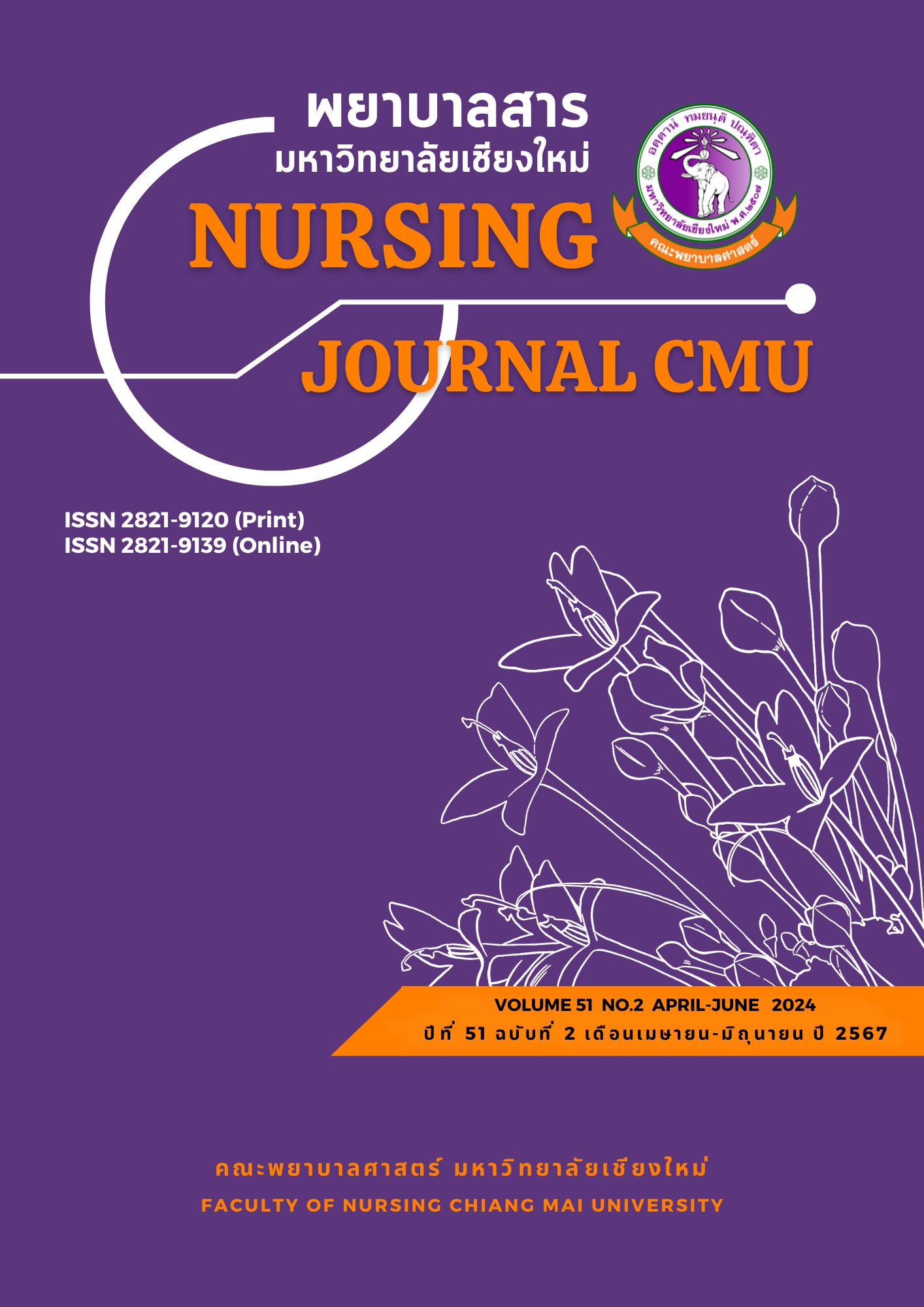ความเข้มแข็งทางใจและคุณภาพชีวิตที่เกี่ยวข้องกับสุขภาพในผู้ที่เป็นมะเร็งปอด ที่ได้รับยาเคมีบำบัดครบ ในสาธารณรัฐประชาชนจีน
คำสำคัญ:
ความเข้มแข็งทางใจ, คุณภาพชีวิตที่เกี่ยวข้องกับสุขภาพ, มะเร็งปอด, การได้รับยาเคมีบำบัดครบบทคัดย่อ
การได้รับยาเคมีบำบัด เป็นการรักษาหลักสำหรับโรคมะเร็งปอด ซึ่งอาจมีผลต่อคุณภาพชีวิตที่เกี่ยวข้องกับสุขภาพ นอกจากนี้ การได้รับยาเคมีบำบัดยังมีผลโดยตรงต่อความเข้มแข็งทางใจ วัตถุประสงค์ของการศึกษาครั้งนี้ เพื่อศึกษาความเข้มแข็งทางใจและคุณภาพชีวิตที่เกี่ยวข้องกับสุขภาพ และความสัมพันธ์ระหว่างความเข้มแข็งทางใจและคุณภาพชีวิตที่เกี่ยวข้องกับสุขภาพในผู้ที่เป็นมะเร็งปอดที่ได้รับยาเคมีบำบัดครบ การคัดเลือกกลุ่มตัวอย่าง ใช้วิธีการสุ่มแบบเจาะจง เพื่อเลือกกลุ่มตัวอย่างจากโรงพยาบาลในสังกัดแห่งมหาวิทยาลัยเฉิงตู สาธารณรัฐประชาชนจีน จำนวน 134 ราย เครื่องมือที่ใช้ในการวิจัยประกอบด้วย แบบฟอร์มข้อมูลส่วนบุคคล แบบสอบความเข้มแข็งทางใจสำหรับผู้ป่วยมะเร็ง และแบบสอบถามคุณภาพชีวิตในผู้ป่วยมะเร็ง วิเคราะห์ข้อมูลโดยใช้สถิติเชิงพรรณนา และสถิติ Spearman's rank-order correlation test
ผลการศึกษาพบว่า ค่าเฉลี่ยของความเข้มแข็งทางใจเท่ากับ 71.43 ± 18.11 สำหรับค่าเฉลี่ยคุณภาพชีวิตที่เกี่ยวข้องกับสุขภาพ หมวดสภาวะสุขภาพโดยรวมเท่ากับ 60.70 ± 28.37 ปัญหาของหมวดอาการทั่วไป 3 ลำดับแรก ได้แก่ ปัญหาทางการเงิน เหนื่อยล้า และนอนไม่หลับ ปัญหาอาการเฉพาะของมะเร็งปอด 3 ลำดับแรก ได้แก่ หายใจเหนื่อย เจ็บปวดในอก และไอ ความเข้มแข็งทางใจมีความสัมพันธ์ทางบวกระดับสูงกับมิติทางบวกของคุณภาพชีวิตที่เกี่ยวข้องกับสุขภาพ อย่างมีนัยสำคัญทางสถิติ (สภาวะสุขภาพโดยรวม การทำหน้าที่ด้านบทบาท และการทำหน้าที่ด้านอารมณ์) (rs = .78, .72, .71, p < .01 ตามลำดับ) และ มีความสัมพันธ์ทางลบกับมิติทางลบอย่างมีนัยสำคัญทางสถิติ (เหนื่อยล้า หายใจเหนื่อย และเบื่ออาหาร) (rs = -.72, -.64, -.60, p < .01 ตามลำดับ)
ผลการศึกษานี้ อาจจะเป็นประโยชน์ในการสนับสนุนความเข้มแข็งทางใจ ในผู้ที่เป็นมะเร็งปอดที่ได้รับยาเคมีบำบัดครบในประเทศจีน ซึ่งอาจจะเพิ่มคุณภาพชีวิตที่เกี่ยวข้องกับสุขภาพได้ และควรพิจารณาการออกแบบการวิจัยเชิงทดลองในอนาคต
เอกสารอ้างอิง
Aaronson, N. K., Ahmedzai, S., Bergman, B., Bullinger, M., Cull, A., Duez, N. J., Filiberti, A., Flechtner, H., Fleishman, S. B., Haes, J. C. J. M., de, Kaasa, S., Klee, M., Osoba, D., Razavi, D., Rofe, P. B., Schraub, S., Sneeuw, K., Sullivan, M., & Takeda, F. (1993). The European organization for research and treatment of cancer QLQ-C30: A quality-of-life instrument for use in international clinical trials in oncology. JNCI: Journal of the National Cancer Institute, 85(5), 365–376.
Bergman, B., Aaronson, N. K., Ahmedzai, S., Kaasa, S., & Sullivan, M. (1994). The EORTC QLQ-LC13: A modular supplement to the EORTC core quality of life questionnaire (QLQ-C30) for use in lung cancer clinical trials. European Journal of Cancer, 30(5), 635–642.
Chen, H. L., Liu, K., & You, Q. S. (2018). Self-efficacy, cancer-related fatigue, and quality of life in patients with resected lung cancer. European Journal of Cancer Care, 27(6), e12934. https://doi.org/10.1111/ecc.12934
Hu, T., Xiao, J., Peng, J., Kuang, X., & He, B. (2018). Relationship between resilience, social support as well as anxiety/depression of lung cancer patients: A cross-sectional observation study. Journal of Cancer Research and Therapeutics, 14(1), 72–77.
Huang, Z. P., Cheng, H. L., Loh, S. Y., & Cheng, K. K. F. (2020). Functional status, supportive care needs, and health-related quality of life in advanced lung cancer patients aged 50 and older. Asia-Pacific Journal of Oncology Nursing, 7(2), 151–160.
Lee, J. L., & Jeong, Y. (2019). Quality of life in patients with non–small cell lung cancer: Structural equation modeling. Cancer Nursing, 42(6), 475–483.
Li, P., Yu, J., Wang, X., Pang, X., Yu, C., & Xu, Y. (2022). Study on the evaluation of lung cancer patients from the three aspects of emotion. Contrast Media & Molecular Imaging, 8139680. https://doi.org/10.1155/2022/8139680
Lugg, S. T., Agostini, P. J., Tikka, T., Kerr, A., Adams, K., Bishay, E., Kalkat, M. S., Steyn, R. S., Rajesh, P. B., Thickett, D. R., & Naidu, B. (2016). Long-term impact of developing a postoperative pulmonary complication after lung surgery. Thorax, 71(2), 171–176.
Polanski, J., Jankowska-Polanska, B., Rosinczuk, J., Chabowski, M., & Szymanska-Chabowska, A. (2016). Quality of life of patients with lung cancer. OncoTargets and Therapy, 9, 1023–1028. https://doi.org/10.2147/OTT.S100685
Polit, D. F., & Beck, C. T. (2004). Nursing research: Principles and methods. Lippincott Williams & Wilkins.
Staff, N. P., Grisold, A., Grisold, W., & Windebank, A. J. (2017). Chemotherapy-induced peripheral neuropathy: A current review. Annals of Neurology, 81(6), 772–781.
Sung, H., Ferlay, J., Siegel, R. L., Laversanne, M., Soerjomataram, I., Jemal, A., & Bray, F. (2021). Global cancer statistics 2020: GLOBOCAN estimates of incidence and mortality worldwide for 36 cancers in 185 countries. CA: A Cancer Journal for Clinicians, 71(3), 209–249.
Wan, C., Zhang, C., Tu, X., Feng, C., Tang, W., Luo, J., & Meng, Q. (2008). Validation of the simplified Chinese version of the quality of life instrument EORTC QLQ-LC43 for patients with lung cancer. Cancer Investigation, 26(5), 504–510.
Wang, Q., Peng, H., & Chen, S. (2017). Study on correlation between quality of life and positive psychological characters of patients with lung cancer. Chinese General Practice Nursing, 15(11), 1291-1293.
Wu, L. P., Xiao, C. Q., Fan, Y. Y., & Luo, M. N. (2022). The correlation between psychological resilience and the quality of life among nasopharyngeal cancer patients undergoing radiotherapy. Chinese Preventive Medicine, 2022, 2–7.
Xiang, L. N., Wang, H. W., Zhu, Y., Zheng, M. M., Li, X. R., & Wang, S. M. (2022). Psychological resilience trajectory of patients with head and neck cancer undergoing radiotherapy and its influencing factors. Chinese Nursing Research, 36(18), 3202–3208.
Ye, Z. J. (2018). Development and validation of Resilience Scale Specific to Cancer (RS-SC) in Chinese patients with cancer diagnosis. Traditional Chinese Medicine University of Guangzhou.
Ye, Z. J., Liang, M. Z., Li, P. F., Sun, Z., Chen, P., Hu, G. Y., Yu, Y. L., Wang, S. N., & Qiu, H. Z. (2018). New resilience instrument for patients with cancer. Quality of Life Research: An International Journal of Quality of Life Aspects of Treatment, Care and Rehabilitation, 27(2), 355–365.
Zeien, J., Qiu, W., Triay, M., Dhaibar, H. A., Cruz-Topete, D., Cornett, E. M., Urits, I., Viswanath, O., & Kaye, A. D. (2022). Clinical implications of chemotherapeutic agent organ toxicity on perioperative care. Biomedicine & Pharmacotherapy, 146, 112503. https://doi.org/10.1016/j.biopha.2021.112503
Zhang, J., Yin, Y., Wang, A., Li, H., Li, J., Yang, S., Wu, Y., & Zhang, J. (2021). Resilience in patients with lung cancer: Structural equation modeling. Cancer Nursing, 44(6), 465–472.
ดาวน์โหลด
เผยแพร่แล้ว
รูปแบบการอ้างอิง
ฉบับ
ประเภทบทความ
สัญญาอนุญาต
ลิขสิทธิ์ (c) 2024 พยาบาลสาร มหาวิทยาลัยเชียงใหม่

อนุญาตภายใต้เงื่อนไข Creative Commons Attribution-NonCommercial-NoDerivatives 4.0 International License.
บทความที่ได้รับการตีพิมพ์เป็นลิขสิทธิ์ของวารสารพยาบาลสาร
ข้อความที่ปรากฏในบทความแต่ละเรื่องในวารสารวิชาการเล่มนี้เป็นความคิดเห็นส่วนตัวของผู้เขียนแต่ละท่านไม่เกี่ยวข้องกับมหาวิทยาลัยเชียงใหม่ และคณาจารย์ท่านอื่นๆในมหาวิทยาลัยฯ แต่อย่างใด ความรับผิดชอบองค์ประกอบทั้งหมดของบทความแต่ละเรื่องเป็นของผู้เขียนแต่ละท่าน หากมีความผิดพลาดใด ๆ ผู้เขียนแต่ละท่านจะรับผิดชอบบทความของตนเองแต่ผู้เดียว






